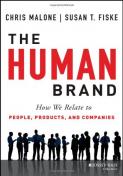BKMT READING GUIDES
The Human Brand: How We Relate to People, Products, and Companies
by Chris Malone, Susan T. Fiske
Hardcover : 208 pages
0 club reading this now
0 members have read this book
Introduction
Why we choose companies and brands in the same way that we unconsciously perceive, judge, and behave toward one another People everywhere describe their relationships with brands in a deeply personal way we hate our banks, love our smartphones, and think the cable company is out to get us. What's actually going on in our brains when we make these judgments? Through original research, customer loyalty expert Chris Malone and top social psychologist Susan Fiske discovered that our perceptions arise from spontaneous judgments on warmth and competence, the same two factors that also determine our impressions of people. We see companies and brands the same way we automatically perceive, judge, and behave toward one another. As a result, to achieve sustained success, companies must forge genuine relationships with customers. And as customers, we have a right to expect relational accountability from the companies and brands we support. * Applies the social psychology concepts of "warmth" (what intentions others have toward us) and "competence" (how capable they are of carrying out those intentions) to the way we perceive and relate to companies and brands * Features in-depth analyses of companies such as Hershey's, Domino's, Lululemon, Zappos, Amazon, Chobani, Sprint, and more * Draws from original research, evaluating over 45 companies over the course of 10 separate studies The Human Brand is essential reading for understanding how and why we make the choices we do, as well as what it takes for companies and brands to earn and keep our loyalty in the digital age.
Editorial Review
Q&A with Chris Malone and Susan Fiske, authors of The Human Brand
When people make statements like "I hate my cable company" or "I love my smartphone," what's happening there psychologically?
As humans, we have developed a remarkable ability to draw quick conclusions about others based on surprisingly little information. We use those same powers of detection to draw conclusions about the people we buy products and services from, even if we never have direct contact with them. We infer a great deal about the intentions of our cable companies and smartphone makers from the experience we have with their products and services, as well as all the information about them we are exposed to. As a result, whether we realize it or not, we are not actually loyal to companies or brands, but rather we are loyal to what we believe we know about the people behind them.
How did you two first meet and come to work together?
I (Chris) first stumbled upon Susan's work through an article in Harvard Business Review, which led me to discover Susan's extensive academic research on warmth and competence. I contacted Susan with an email that started with, "I've become a fan of your work," and proposed that we test whether her human perception model was predictive of how customers relate to companies and brands. It's been a wonderful and enlightening journey together ever since.
What do you mean by warmth and competence?
Leading researchers and social psychologists have shown that we judge others almost instantly along two dimensions: What are the intentions of other people toward me? And how capable are they of carrying out those intentions? In the academic world, these two categories of social perception are known as warmth and competence, respectively, and they drive most of our emotions and behavior toward other people.
Through our research over the past three years, Susan and I have discovered that customers engage with and become loyal to companies and brands in the same way they do with other people—on the basis of their warmth and competence.
Which companies and brands did you find are successfully building lasting relationships with their customers? Which ones are failing?
There are many companies and brands, large and small, that use technology to build and maintain one-to-one relationships with customers. Some examples from our book include Zappos, Domino's, and Mercedes, as well as Dr. Kelly Faddis, Zane's Cycles, and Honest Tea. What these companies have in common is that they put the best interests of their customers ahead of their own short-term financial interests.
On the other hand, companies that focus heavily on maximizing shareholder value in the short term end up doing themselves more harm than good in the process. Despite their other successes, large companies like Toyota, Sprint, and Goldman Sachs have learned this lesson the hard way and are still recovering from their missteps. Perhaps not surprisingly, banks, oil companies, airlines, and telecom firms dominate the list of most disliked companies. What these have in common is a reputation for profiting at their customers' expense.
Discussion Questions
No discussion questions at this time.Book Club Recommendations
Recommended to book clubs by 0 of 0 members.
Book Club HQ to over 90,000+ book clubs and ready to welcome yours.
Get free weekly updates on top club picks, book giveaways, author events and more








